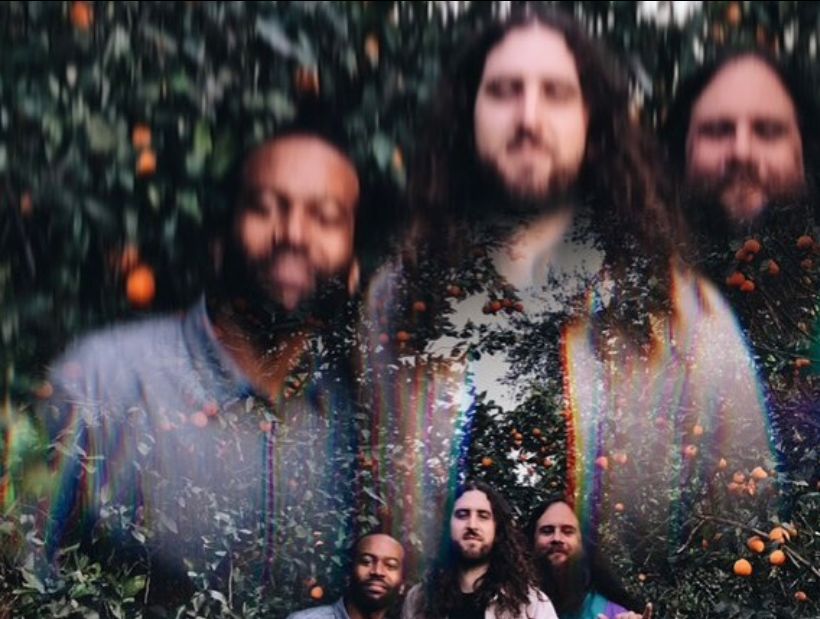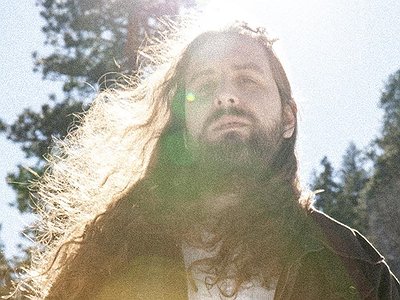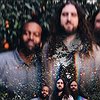Name: Nate Mercereau
Nationality: American
Occupation: Guitarist, composer, songwriter, improviser
Current Release: Nate Mercereau's new track, "Facing The Sideways Rain," featuring Kamasi Washington and Carlos Niño, is out now via Alpha Pup.
Recommendations: The Mysticism of Sound and Music - The Sufi Teaching of Hazrat Inayat Khan
If you enjoyed this Nate Mercereau interview and would like to stay up to date with his music, visit his official homepage. He is also on Instagram, bandcamp, Soundcloud, and twitter.
Over the course of his career, Nate Mercereau has worked with a wide range of artists, including Surya Botofasina, Lizzo, Carlos Niño, Shawn Mendes, Idris Ackamoor, and André 3000.
[Read our Surya Botofasina interview]
[Read our Carlos Niño interview]
Where does the impulse to create something come from for you? What role do often-quoted sources of inspiration like dreams, other forms of art, personal relationships, politics etc play?
My impulse to create comes from a desire to explore possibilities, and record what I'm hearing, feeling and experiencing. It can be kind of like "going there" and reporting back. It’s also a place to process and share.
For me, sound is infinite possibility. I am a person living life, I'm going to find more and different impulses to create from as I travel through.
For you to get started, do there need to be concrete ideas – or what some have called a “visualisation” of the finished work? What does the balance between planning and chance look like for you?
I try to be as open as possible to all the ways things can go. Sometimes the idea is there and it’s ready to be created.
Duets | Golden Gate Bridge felt like that. That was something I saw as an opportunity in the world and jumped to making it happen immediately. I didn't know how it was going to go, but I knew I wanted to get involved with whatever it was going to be.
The physical and emotional act of sonic exploration itself can also reveal new worlds. That’s part of how SUNDAYS was made — weekly live streamed concerts I gave on Sundays over the course of a year.
It started there and turned into more than that -- the concept was to show up with my whole being and compose and explore spontaneously with an audience, and everything would come from there. Having that intentional place for me to tune in every week allowed for a lot of music to happen that I wouldn’t have made otherwise.
Those are just two examples of records I've made and how they went, it really feels like the creative process is different every time I engage with it.
Is there a preparation phase for your process? Do you require your tools to be laid out in a particular way, for example, do you need to do ‘research’ or create ‘early versions’?
I’m into living with full presence and awareness, and that’s all I need to do to be here. I record everything -- live shows, sound checks, first notes after picking up the instrument, first intentions are very meaningful to me.
I'm about always being in it and being here and there for whatever I'm doing. The process of showing up fully to whatever it is, and bringing it all to that moment, creates something.
What do you start with? And, to quote a question by the great Bruce Duffie: When you come up with a musical idea, have you created the idea or have you discovered the idea?
There’s so many ways it can go, and it's often a combination of things. I’ve heard fully realized pieces of music that I’ve done my best to put into recorded form, I also sit down with an instrument with only the intention of really being there and letting my intuition or listening guide the idea.
More pathways can open along the way to other ideas and feelings, that can come from me, my experiences on planet Earth, or that are maybe being transmitted through some other dimension, or history, or a type of visitor, or a conversation ... it's infinite.
During the process of recording New Blue Sun, André, Carlos and I had many conversations about things like this -- where the music comes from, bringing our whole lives to the moment of spontaneous composition, the sense of exploration and discovery available in music, how our instruments might one day get to know us as we know them, and change shape as our relationship changes, about how when you’re hearing that symphony of sound, wherever you're hearing it from, you could just plug in a cable to yourself and record it straight from the source into ProTools.
We talk about these things because we already feel them happening, and that opens up the thoughts of more possible realities.
I'm interested in how creativity will progress, and how we might share our expressions in new visceral and direct ways. I was at a talk/presentation that Iasos was giving at the Philosophical Research Society in Los Angeles, and he spoke about just “thinking” of music and having it immediately blasted out through the speakers of a concert hall … exciting.
Many writers have claimed that as soon as they enter into the process, certain aspects of the narrative are out of their hands. Do you like to keep strict control or is there a sense of following things where they lead you?
To me, it’s more of a space I can enter where, if I’m feeling open to it, anything is possible, which is really how life is all the time, there's endless waves of infinite possibility. And currents within those currents ...
I'm into maintaining my connection to that in all types of creative contexts.
Often, while writing, new ideas and alternative roads will open themselves up, pulling and pushing the creator in a different direction. Does this happen to you, too, and how do you deal with it? What do you do with these ideas?
Yes! I deal with it, and move towards the things I like and that I’m feeling in the moment. If an idea is coming in totally unrelated to the piece I’m dealing with at the time, I immediately record it in open space in the same session, and pursue it as far as it goes or return to it later.
I always take advantage of any music I’m hearing that I’m liking, never lose it.
There are many descriptions of the creative state. How would you describe it for you personally? Is there an element of spirituality to what you do?
My whole life is a creative state.
Once a piece is finished, how important is it for you to let it lie and evaluate it later on? How much improvement and refinement do you personally allow until you’re satisfied with a piece? What does this process look like in practise?
I'm into letting the recording be a record of life at that time, and I'm also into the ideas changing or finding new environments at some point ... it's all happening right now.
I keep my ideas and recordings as fluid as possible for use in any projects I'm a part of. I offer this to myself and to other artists and collaborators I work with. I listen to feelings of completion and further exploration. It’s important for me to feel inspired about it and then share that.
It goes many different ways — right now I have music in progress that I’ve been with for about two years, I come to it when I feel it, adjusting and completing, fine tuning and exploring, and simultaneously, I’ve produced and released four different projects that got there in other ways:
Subtle Movements - Surya Botofasina, Nate Mercereau, Carlos Niño, ...
... Ojai Orange Grove Concert, ...
... Live in Venice - Nate Mercereau with Josh Johnson and Carlos Niño, ...
... and Free, Dancing . . . - Carlos Niño, Idris Ackamoor, Nate Mercereau.
I also contribute as a producer/songwriter/instrumentalist to albums that friends and collaborators are making ... it’s all great and I like the variety of experiences available.
When you’re in the studio to record a piece, how important is the actual performance and the moment of performing the song still in an age where so much can be “done and fixed in post?“
I consider every part of the process to be the "performance," but lately I'm exploring different terminology. I'm seeing how it feels to not use the word "performance" as it has a connection with "entertainment" and I don't consider that to be what I do. People can receive it however they receive it, but it's more of an offering, or a carrying out of a creative motion.
Editing can be carrying out the creative motion, changing something later can be carrying out the creative motion … post production is continuing the vision of spontaneous creation.
As far as "fixing" things, before I do that I first try to consider how to reveal or highlight things as things MORE what they are. Even through the "fixing", that's my intention. 
Nate Mercereau Carlos Nino Josh Johnson Image (c) the artists
Even recording a solo song is usually a collaborative process. Tell me about the importance of trust between the participants, personal relationships between musicians and engineers and the freedom to perform and try things – rather than gear, technique or “chops” - for creating a great song.
Trust, openness, support, love, willingness, exploration, discovery, presence, attunement, awareness, these are some things I appreciate in a creative situation. If those things are really there, there are no limits. And if those things don't seem available in the moment or you don't feel them around you, they're always available within you.
I'm learning to not judge and just be there. In any circumstance where things are not ideal to me in some way, that energy will be present in the creative process, and often with differing results, that I'm not always the best judge of in the moment. I try to keep that in mind when I’m in a situation I’m not feeling for one reason or another, because it's less about my judgement of the situation, and more about me really showing up and engaging.
I often listen back to those recordings and find very special musical/emotional moments, and they sometimes end up as very important pieces of music for me.
What’s your take on the role and importance of production, including mixing and mastering for you personally? In terms of what they contribute to a song, what is the balance between the composition and the arrangement (performance)?
For me, the goal of all of those processes is to let something be the most itself it can be.
Tuning in to each of those terms -- production, mixing, mastering, composition, arrangement -- and also environment, framing, etc. these words can all inspire helpful perspectives on what is happening with a piece of music as it is being made.
After finishing a piece or album and releasing something into the world, there can be a sense of emptiness. Can you relate to this – and how do you return to the state of creativity after experiencing it?
When I finish and share music, I feel it as the experience of expanding. I've released music, I've expanded, I'm experiencing expansion, I've released something and made space within myself, and also have begun to travel with the released music.
I also always have many different things in progress, so releasing something makes space for other ideas to come forward.
Music is a language, but like any language, it can lead to misunderstandings. In which way has your own work – or perhaps the work of artists you like or admire - been misunderstood? How do you deal with this?
Being understood is great but I don't require it. Interesting things happen in the various levels of understanding and misunderstanding.
I allow myself to be the most myself I can be, and let things take shape from there.
Creativity can reach many different corners of our lives. Do you personally feel as though writing a piece of music is inherently different from something like making a great cup of coffee? What do you express through music that you couldn’t or wouldn’t in more “mundane” tasks?
The way we can discover and explore, sharing our expressions and creations together is amazing to me, in all contexts.
For me, I love doing this with music, but it's available to all of us all the time in many ways and with many things. I feel like it's often about the energy brought to the thing, more than the thing itself.





